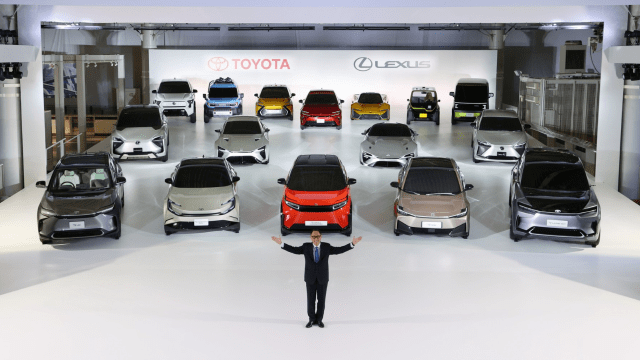The world’s biggest car manufacturers have been analysed in Greenpeace’s new report, with Toyota put on blast for falling behind on the shift to renewables and decarbonisation.
Greenpeace’s report, Auto Environmental Guide 2022, analysed the top 10 automakers (as in, the 10 companies that produce the most cars for the global market). Toyota, which is Australia’s most popular carmaker, ranked dead last.
On the “scoreboard” you’ll find Toyota last, with 10 points overall, and only 0.18 per cent of its 2021 sales being zero-emissions vehicles.
Leading the ranking is General Motors, with a score of 38.5 points and 8.18 per cent of its vehicles sold in 2021 being zero-emissions models. There are no General Motors EVs in Australia, but the brand owns Buick, Cadillac, Chevrolet, GMC and Hummer, with most EVs sold in China. It has an agreement with Honda to develop electric cars.
Meanwhile, although Toyota has a partnership with EV battery giant BYD, Greenpeace says that the company has been falling behind on offering ZEVs. The brand offers PHEVs, sure, but these are largely ICE vehicles with tiny electric batteries, still relying on fossil fuels.
Toyota is also preparing to launch its first mainstream EV, the BZ4X.
“Australia is at a crossroads in its electric vehicle transition, as the Albanese Government considers the introduction of fuel efficiency standards,” said Violette Snow, a Greenpeace Australia-Pacific campaigner.
“The International Energy Agency says to get to net zero by 2050, all new cars must be electric by 2035. If Toyota and the petrol car industry don’t support this timeline, how do they think Australia can meet our climate goals?”
That being said, Toyota does have a commitment to release 30 electric vehicles before 2030. This includes the Bz3, Toyota’s planned answer to the Tesla Model 3.
A Toyota spokesperson provided Gizmodo Australia with the following comment:
“Globally, Toyota is focused on achieving a long-term and sustainable future as we move towards our ultimate goal of carbon neutrality.
“Carbon is the enemy and, as the largest supplier of hybrid vehicles in Australia with more than 290,000 sold since 2001, Toyota Australia has made a significant contribution to reducing vehicle tailpipe carbon emissions in this country.
“Our parent company is making large investments into carbon-reducing and carbon-netural vehicles and technologies, including the recent announcement of a 730 billion yen (approx. $5.6B USD) investment towards supplying batteries for BEVs.
“In December 2021, it was that by 2030, Toyota is targeting global sales of 3.5 million BEVs a year with plans to launch 30 BEV models, resulting in a comprehensive line-up of electric passenger cars, SUVs and commercial vehicles. Locally, we will introduce our first dedicated BEV, the bZ4X, during 2023.
“Importantly, Toyota is not limited to a single technical solution. We remain absolutely committed to providing our customers with a diverse range of vehicles and technologies, including BEVs, that will help them on their journey to zero tailpipe emissions based on their individual motoring circumstances, ensuring no-one is left behind.
“Having a diverse approach to electrification, with the aim of reducing carbon emissions, is important because Australians have vastly different motoring needs, including varying passenger, cargo and towing capacity requirements, and significantly different levels of access to infrastructure throughout urban, rural and remote Australia to support BEVs and other emerging zero/low tailpipe emissions powertrain options.
“Toyota Australia would welcome the establishment of a mandatory Australian standard for new-vehicle C02 tailpipe emissions that works to support the achievement of the Paris Agreement goals. In the absence of mandated standards, the local industry has already voluntarily adopted 2030 C02 emissions reduction stretch targets with built-in reviews.”
Here’s Greenpeace’s report.
If you’re interested in buying an EV, here are the vehicles that are available, and here are the upcoming electric cars in Australia.
This article has been updated since it was originally published.
